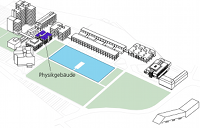Position Indication:
Content

Computational Physics II
lecture: Wed. 10:15-11:45, P 215exercise: Wed. 14:30-15:15, P 215
This second course in computational physics deals with simulations of classical and quantum mechanical systems of many particles. Applications of the methods introduced in this class include all branches of physics: solid state physics (crystal growth, surfaces,...), soft matter physics (polymers,...), liquid state physics (solute-solvent systems,...), phase transitions, ab initio calculations of atomic interactions, quantum fluids, and even astrophysics.
The concepts of classical and quantum mechanics and of statistical physics which are needed in the class will be recapitulated.
Attendance of the lecture Computational Physics I is not a requirement.
Table of Contents:
Part 1:
Molecular Dynamics (MD)
Steps of an MD simulation
Integrating the equation of motion - Liouville
formalism
Force Fields
Some MD tricks
Calculation of Physical Properties
Linear Response Theory
Canonical ensemble MD: extended system methods
Part 2:
Classical Monte Carlo Methods
Pseudo Random numbers
Probability distribution functions
Metropolis algorithm
(Magnetism: The Ising model)
Part 3:
Quantum Monte Carlo Methods
Variational Monte Carlo
Diffusion Monte Carlo
Excited states and the Fermion sign problem
(Excited states and ill-posed inverse problems)
The contents of the lecture may be subject to minor changes. You
will work on 2 projects, each
consisting of (i) writing a program, (ii)
conducting 'experiments' with the program and obtaining results,
and (iii) writing a report about it.
The final grade for the lecture and exercise class is based on your 2
written reports and on your
participation in class discussion
Literature:
part I,II:
M. P. Allen & D. J. Tildesley "Computer
Simulations of Liquids", Oxford Science Pub.
D. Frenkel & B. Smit "Understanding Molecular
Simulation", Academic Press
advanced: D. J. Evans & G. P. Morriss
"Statistical
Mechanics of Nonequilibrium Liquids", Academic Press
M. Griebel et al. "Numerische Simulation in der
Molekueldynamik", Springer
part III:
R. Guardiola in "Microscopic Quantum Many-Body
Theories and their Applications", Lecture
Notes in Physics, Springer
B. L. Hammond et al. "Monte Carlo Methods in Ab
Initio Quantum Chemistry", World Scientific Pub.


 Audit hochschule und familie
Audit hochschule und familie

